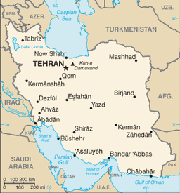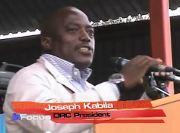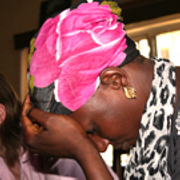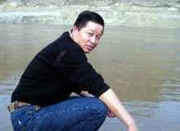Amid anguish and mourning, church leaders distinguish between defense and retaliation.
By Lekan Otufodunrin and Obed Minchakpu
 |
| The damaged St. Theresa’s Catholic Church Photo courtesy: Abayoma Fayese |
MADALLA, Nigeria, December 29 (Compass Direct News) – Until last Sunday, Christmas Day, St. Theresa’s Catholic Church on the outskirts of Nigeria’s capital city, Abuja, was just one of many branches of Christianity in the country.
An early morning suicide bomb attack by Islamic extremist group Boko Haram that left at least 45 people dead and 73 others injured, however, has turned the ruins in Madalla, Niger state into a national mourning site. Christian leaders and government officials have arrived to confirm the extent of human and material damage, but four days after the attack, church leaders were still trying to determine a final death toll. Three of the 45 confirmed dead were policemen on guard duty at the time of the attack, and most of the rest were parishioners.
While some church members have stayed away from mass at the remnant building, and other area worship centers are empty, others continue to attend St. Theresa’s.
“The shock of the incident has been very traumatic for the people who were at the scene, and it is going to be difficult for them to recover from it – we are all still mourning,” the Rev. Joseph Akor, director of communication of the Minna Diocese, told Compass. “The worshipers have cause to be afraid after an incident like this, but they are strengthened by the blood of the martyrs and have not relented in attending daily Mass.”
The Very Rev. Isaac Achi of St. Theresa’s today said that 73 people were receiving hospital treatment. The Rev. Musa Dada of the Niger state chapter of the Christian Association of Nigeria (CAN) said that of those hurt in the blast, 50 were seriously injured. On the same day as the Madalla attack, Boko Haram also detonated bombs at Mountain of Fire and Miracles Church in Jos, Plateau state, though no one was killed until a policeman who later confronted the assailants was shot. A bomb also exploded at a church in Gadaka, Yobe state, where several people reportedly were wounded.
Akor of the Minna Diocese told Compass that the church was doing everything possible to aid survivors, including those injured and those who lost relatives.
“Many of those who are directly affected can’t still comprehend what happened and why this kind of thing should happen,” he said. “They went to church and didn’t bargain for this kind of thing to happen. It is indeed a trial of our faith but, as in situations like this, we have no choice but to keep praying more.”
A widow who is a member of the church came into the damaged building this morning wailing over the death of her only son. Another woman lost her husband and all their children in the attack. A small girl lost her parents.
The Rev. Isaac Achi decried the loss the church has incurred, telling media this week how the bomb blast cast the body of a 9-year-old child onto the roof of a nearby Anglican church building.
“What happened is very sad,” Achi reportedly said. “Many innocent persons have been killed in this unprovoked attack on our church.”
Recalling how the attack was carried out, church member Joseph Chukwumeka reportedly said the congregation was filing out at the time.
“As members were approaching the frontage of the church, we heard two deadly explosions and most people went blank,” he told news media. “We ran helter-skelter, first of all to save ourselves before we recovered for a rescue operation.”
The 73 injured parishioners were receiving treatment in 12 hospitals in Abuja and in Niger state, church leaders told Compass. The hospitals are the State House Clinic; the National Hospital; Gwagwalada Specialist Hospital; Suleja General Hospital; Major Hospital, Kwamba; Delight Hospital, Suleja; Suzan Hospital, Suleja; Daughters of Charity Hospital, Kubwa; Diamond Crest Hospital, Zuba; Solace Hospital, Suleja; Lucas Hospital, Madalla; and Kubwa General Hospital.
St. Theresa’s Catholic Church has about 2,400 members, and on Sundays there are three worship services with an average attendance of about 800 worshipers.
The Most Rev. Martin Igwe Uzoukwu, bishop of Minna Diocese, said at a press conference at the church site today that the destruction amounted to an attack on area Christians.
“I call this an act of terrorism leveled against my people who went to church to celebrate the Holy Day of Christmas,” Uzoukwu said. “The Boko Haram group has claimed responsibility for this crime against us and the entire people of Niger state.”
The attack on the Madalla church marks the second time in eight months that a parish of the Catholic Church has been attacked, he said, the first having taken place in April, when Muslims set fire to St. Augustine’s Catholic Church at Angwan Kaje, in the city of Minna.
“Reflecting on the ugly and unfortunate but avoidable incident in Madalla, I stare at the fact that we have lost more than 40 people, with many others wounded, maybe maimed forever,” he said.
Uzoukwu urged all Christians to forgive the attackers and to remain steadfast in the Christian faith.
“We are called to forgive, as that is what Jesus taught us,” he said. “We should therefore forgive, even as we continue to pray for those who persecute us.”
Earlier in the week, CAN President Ayo Oritsejafor called for Christians to defend themselves.
“As CAN president I will not encourage revenge, but I will ask all Christians to protect themselves anyway they can,” he said. “Why should anybody come and kill you in your house? Protect yourself, protect your place of worship, protect your properties.”
During a meeting with President Goodluck Jonathan on Wednesday (Dec. 28), Oritsejafor reportedly maintained that the attack on the church was a declaration of war on Christians and the country by Muslims and urged the government to prevent future occurrences lest they force Christians to take defensive action.
Speaking outside the church building today, Oritsejafor said that while he still does not encourage retaliation, “The consensus is that the Christian community nationwide will be left with no other option than to respond appropriately if there are any further attacks on our members, churches and property.”
Calling on Muslim leaders to condemn the attacks and take greater action to bring peace, Oritsejafor said they had abdicated “their responsibilities” and also that Christians were “fast losing confidence in government’s ability to protect our rights.”
Uzoukwu, bishop of the Minna Diocese, pleaded for Nigerian Muslims to address the challenge posed by Boko Haram to the nation’s security.
“I call on all my peace-loving Muslim friends to condemn publicly this act against us,” he said. “I call on all our religious leaders, traditional rulers and custodians of the land in Niger state to stand up strongly against this Boko Haram group.”
President Jonathan, a Christian, has reportedly tried to forestall sectarian violence by holding urgent meetings with Muslim and Christian leaders.
On Tuesday (Dec. 27), Nigeria’s primary Muslim cleric, the Sultan of Sokoto, denounced the Christmas Day attacks and called for calm.
“I want to assure all Nigerians that there is no conflict between Muslims and Christians, between Islam and Christianity,” said Muhammad Sa’ad Abubakar. “It is a conflict between evil people and good people, and the good people are more than the evil-doers.”
Akor of St. Theresa’s told Compass that clergymen are appealing for peace.
“We don’t believe in resorting to violence but will keep appealing to the government to ensure the security of every citizen and to our members to remain law abiding no matter the situation,” he said.
END













